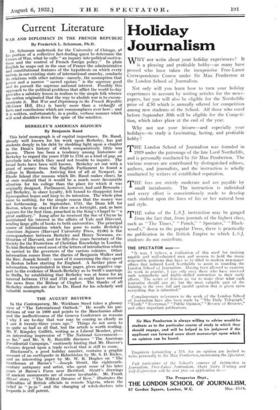This brief monograph is of capital importance. Dr. Rand, theady
well known for his work upon Berkeley, has put students deeply in his debt by shedding light upon a chapter in the Dean's history of which comparatively little was known. There has been a tendency among historians of Berkeley to regard the years 1729 to 1731 as a kind of gap, an interlude into which they need not trouble to inquire. The broad facts have been well known. Berkeley set out with a grant of money from the English Parliament to found a college in Bermuda. Arriving first of all at Newport, in Rhode Island (for reasons which Dr. Rand makes clear), he at once realized that it would be a much more favourable situation for his college than the place for which it was originally designed. Parliament, however, had said Bermuda : and Berkeley, in sheer loyalty, felt bound to disappoint local Episcopalian hopes and keep to its intention. The whole plan came to nothing, for the simple reason that the money was not forthcoming. In September, 1781, the Dean left for Boston, where he stayed for close on a fortnight, and, as here appears for the first time, preached in the King's Chapel to" a great auditory." Long after he received the See of Cloyne he maintained his interest in the affairs of Yale and Harvard, sending large gifts of books to both universities. The principal source of information which has gone to make Berkeley's American Sojourn (Harvard University Press, 32.00) is the correspondence between Berkeley and Henry Newman, ex- librarian of Harvard, and for fifty-five years Secretary of the Society for the Promotion of Christian Knowledge in London. To him Berkeley owed most of the letters of introduction which he carried to the governors of the various colonies. Other information comes from the diaries of Benjamin Walker and the Rev. Joseph Sewall : most of it concerning the days spent in Boston before starting for England. A further piece of information, recapitulated in these pages, gives negative sup- port to the evidence of Monck-Berkeley as to Swift's marriage to Stella, by establishing that Berkeley was at home for an interval between 1713 and 1721 and so could have received the news from the Bishop of Clogher. The thanks of all Berkeley students are due to Dr. Rand for his scholarly and valuable monograph.


























 Previous page
Previous page